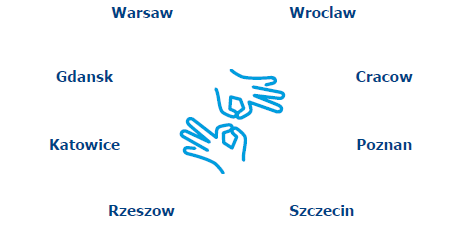Counteracting social exclusion
Business






The PZU Group’s sales strategy mitigates the risk of marginalization and exclusion of certain social groups. The extensive branch chain and the networks of agents collaborating with the PZU Group comprise geographically broadest financial services sales network in the country. Moreover, it is supplemented by the remote channels – LINK4, and also the possibility of using the chain of Bank Pekao and Alior Bank outlets. All this allows to minimize the threat related to limited geographic availability and marginalization of certain groups of clients (e.g. residents of rural areas or disabled people). Moreover, the new business strategy places strong emphasis on leveraging the outlets of individual group entities to increase cross sales (cross-selling).
It is PZU’s ambition to enable the client to make an optimal choice of the services to help him/her protect his/her life, health, property, savings and finances. This means that comprehensive solutions will be offered without segmenting them into product lines of individual group companies. New PZU operates as a uniform close-knit organism, and, as a logical consequence of this, all the companies’ outlet chains are mutually used by all the individual companies. On one hand, this will make it possible to offer a full range of services to a broader group of clients, and, on the other hand, it will increase the accessibility of outlets which offer the Group’s services. As much as 5 out of 12 key initiatives constituting the foundation of the New PZU are the cross-selling initiatives.
Another dimension of the exclusion issue is marginalization of specific groups, e.g. the elderly and the disabled, which are at particular risk of exclusion. At the end of 2017, 32% of PZU outlets were fully, and another 44% partially adapted to the needs of disabled people. There are continuous efforts to further increase the degree of adaptation, e.g. as part of conducted renovations or changes of locations. In addition, in 8 largest cities, clients are provided with access to services in sign language.

Besides architectonic barriers, which the PZU Group companies are trying to remove, there also exist the barriers of a completely different nature. Such barriers require not only the application of technical and infrastructural solutions but also empathy. The client service standards in effect in PZU’s own branches, which have the form of the “Five Steps Theory”, place particular emphasis on the senior citizens’ needs (e.g. potential problems with vision, hearing, mobility or comprehension of complex information). Therefore, the employee guide contains recommendations on how to provide services to senior citizens. In particular, it contains the instruction that the information should be provided in an understandable manner, sometimes more slowly. The same principles apply when providing the services to disabled people, including people with hindered mobility, blind people or persons with impaired vision, deaf people or persons with impaired hearing, or people with speech impediment.
PZU also seeks to meet the expectations of the parents. Playroom corners have been prepared specially for the children, where the child may freely and safely occupy oneself while the parent is taking care of all the matters related to an insurance policy. As at the end of 2017, such playroom corners were in 30% of PZU’s outlets.
In order to meet the needs of the disabled clients, Bank Pekao provides access to its products and services through alternative access channels (websites adapted to the needs of the persons with impaired vision, hotline, ATMs/ deposit machines, outlets), and it also consistently removes the architectonic barriers in the bank outlets by adapting them to the needs of disabled people. In 2016, 69.5% of the bank’s outlets were adapted to the needs of the disabled clients, while in 2017 that figure stood at 72.9%.
In 2017, Alior Bank changed its brand’s claim to “Higher Culture. The Bank of Innovation.” (“Wyższa kultura. Bank Nowości.”) Thus, the bank sent a message that it intended to take the client relations to the whole new level. Referred to as the “Fifth Dimension of Relations”, it is based on the devised Client Service Philosophy. The main values of this approach, which are displayed by the bank employees, include swiftness, simplicity, ethics and teamwork.
Every client is different and has specific needs depending on his/her age, experience and knowledge. Accordingly, the bank no longer uses the official Book of Standards. Instead of it, the Power Cards were implemented, which serve as employee’s guidelines for client relations and they do not contain a strict scenario on how to proceed. The departure from rigid norms allows the employees to provide services to customers in a natural way, i.e. resulting from their internal convictions and experience, in other words, in a way in which the client service employee would like to be treated if he/she were in the client’s place.
